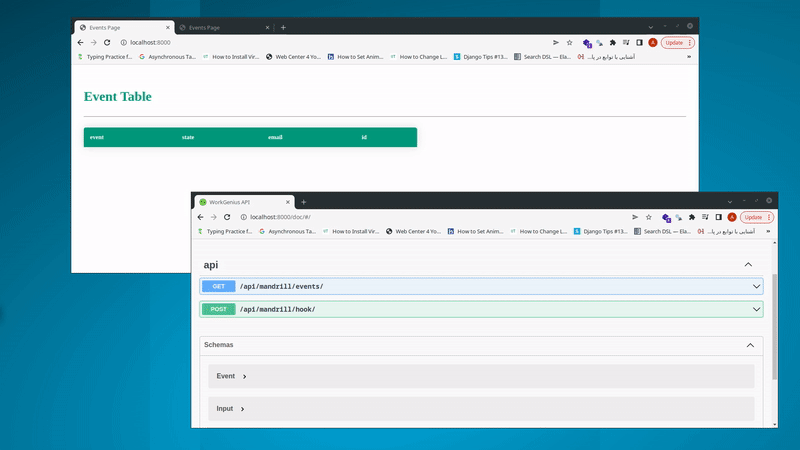A minimal WebSocket Application that can handel Mandrill Events.
Project Setup • EndPoints • Architecture • Libraries • Future Improvements
-
SetUp venv
virtualenv venv source venv/bin/activate -
install Dependencies
pip install -r requirements.txt
-
spin off docker compose
docker-compose -f docker-compose.dev.yml up -d
-
create your env
cp .env.example .env
-
Create tables
python manage.py migrate
-
run the project
python manage.py runserver
-
for running the tests
pytest . -rP
/: index.html websocket client that will be notified when ever you have an event./doc: here you can access to swagger ui and view and test all REST API endpoints./api/hook/: endpoint that you sould setup as a webhook client in mandrill app./api/events/: a test endpoint to get redis keys./ws/email/: websocket server for mandrill events.
- Django, By default, is based on Model-View-Template (MVT) architecture.
- I improved DRF basic architecture with my cookiecutter.
- It also respects separation of concerns, having api, services, selectors, serializers layers.
Api: Api is just an interface for calling other methods in a clean way.Serializers: Provides parsing capabilities for our input and output json responses and that's it .
We are not going to put any bussiness logic in here what so ever.Services: This is were our business logic lives, for Create, Update, Delete Oprations.Selectors: Just like the name suggest when ever we want to select something from the database we use selectors.Utils: any thing which doesn't need any database call, when ever we have some abstractions that can be used inservicesorselectorswe will use utils layer.Views: Just like the Api layer it's just an interface, but it used for template rendering.Consumers: it's an interface for out websocket calls.routing: websocket routerurls: api and template routers
Technically, when you are using frameworks you have little abstraction or desgin patterns, beacuse most of the desgins are actually in the library itself.
But Beacuse Usaully when you have events you can use, Observer DesginPattern.
I used it to showoff my skills but in a real project with this scale this is an unnecessary abstraction:
- Django: Django is a high-level Python web framework
- Django Rest FrameWork: A REST API communication framwork
- Django Channels: A WebSocket communaication framewrok
- Swagger: Sane and flexible OpenAPI 3.0 schema generation for Django REST framework
- Pytest: A Test Library
- DjangoRedis: full featured Redis cache and session backend for Django.
- Even though we tried to isolate our bussins logic it's still depends on the redis, we can add another layer called mapper,
which will mappes python classes with any database. - Better test covrage.
We can add integration test usingseleniumfor our templates.
And we also must add more tests for our socket calls. - If we have lot's of socket calls then,
I would suggest to use a microservice architecture and useGolangorErlangfor better socket handeling.

